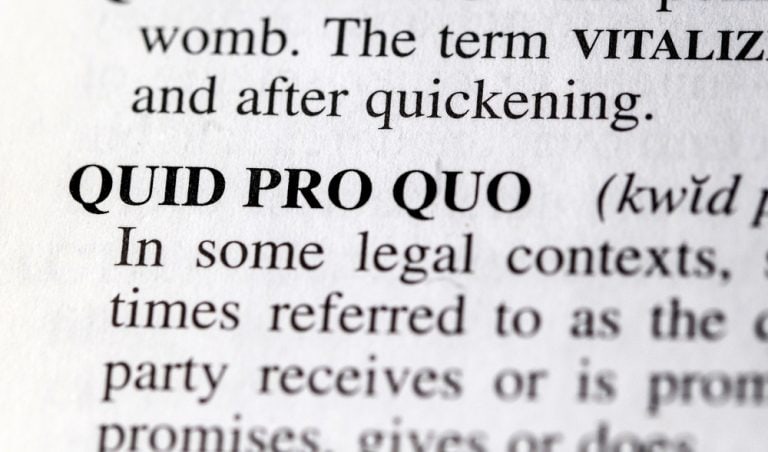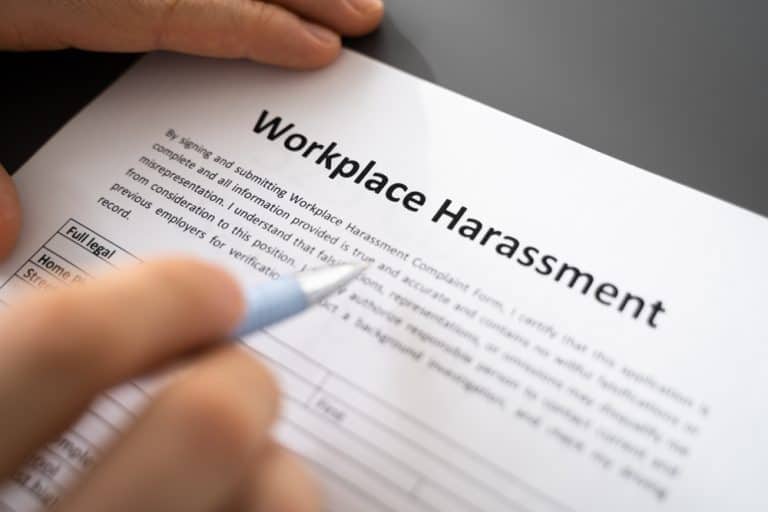Quid Pro Quo Sexual Harassment: Your Legal Rights And How To Take Action

You scratch my back, and I’ll scratch yours…
This principle has shaped human behavior since time immemorial. From ancient political alliances to strategic marriages between royal families to backroom deals in smoky boardrooms, the idea of exchanging one favor for another has always been part of how societies function.
At its core, quid pro quo isn’t inherently wrong. After all, it’s the foundation of commerce: goods exchanged for money, services swapped for services. It’s how business gets done.
But quid pro quo becomes deeply unethical—and in many cases, outright illegal—when it involves sexual demands.
“Wanna keep your job and get that promotion? Then you better sleep with me.”
For generations, victims of these abusive power dynamics had little recourse. Many were silenced, threatened, or fired. But in recent years, the tables have started to turn. Survivors are coming forward, exposing those who abused their authority and filing lawsuits that hold powerful employers and individuals accountable.
The rise of the #MeToo movement has played a pivotal role in this shift. Consequently, survivors are speaking out about the widespread abuse of power in the workplace. What was once whispered about behind closed doors is now fueling high-profile lawsuits, firings, prison sentences, and cultural change across nearly every industry.
In some instances, plaintiffs in quid pro quo sexual harassment lawsuits have been awarded tens of millions of dollars in compensation through jury verdicts or settlements.
Here’s what you need to know about quid pro quo sexual harassment, your legal rights, and the high-profile lawsuits that are changing the landscape.
If you’ve been subjected to quid pro quo sexual harassment, you don’t have to suffer in silence. Legal protections exist to hold harassers accountable and seek compensation for the harm caused. This guide will explain your rights, legal options, and how to take action.
Quid pro quo sexual harassment occurs when a supervisor or person in power demands sexual favors in exchange for workplace benefits—such as a raise, promotion, or continued employment—or threatens damaging consequences for refusal. This form of harassment violates federal and state employment laws and can leave victims feeling trapped and powerless.
The phrase “quid pro quo” is Latin for “this for that”—exchanging one thing for another. In the workplace, this refers to a person in authority offering career advancements or job security in return for sexual favors.
Quid pro quo harassment is distinct from hostile work environment harassment, which involves repeated inappropriate behavior that creates an intimidating workplace. Quid pro quo harassment, on the other hand, involves direct coercion, making it easier to prove legally.
For example, in a hostile work environment, picture a manager regularly making crude sexual jokes or sharing explicit images. The manager makes no direct threats or offers tied to job benefits. In contrast, quid pro quo sexual harassment involves a clear exchange or threat, such as a supervisor saying, “If you want that raise, you’ll wear something sexy and be ready to be picked up at 8:00 sharp!”

Quid pro quo sexual harassment isn’t just morally bankrupt—it’s illegal. Federal law provides clear guidelines to protect workers from being coerced into unwanted sexual activity in exchange for job benefits or protection from negative consequences.
While some federal protections, such as Title VII of the Civil Rights Act of 1964, apply specifically to employers with 15 or more employees, that doesn’t mean smaller employers are off the hook. Many state laws extend similar protections to workers in smaller companies, and courts have consistently found quid pro quo harassment unlawful regardless of employer size, especially when supervisors abuse their authority.
Under Title VII, quid pro quo sexual harassment is explicitly prohibited, and employers can be held legally liable when a supervisor or person in authority conditions employment benefits—like raises, promotions, or continued employment—on sexual favors. Courts have ruled that even a single instance of such conduct can be grounds for legal action.
Federal Protections (Title VII of the Civil Rights Act of 1964):
State-Level Protections:
Even if the company you work for has fewer than 15 employees, you are likely still protected under your state’s law. Speaking with an experienced attorney can help determine which laws apply in your case and how best to proceed.
Survivors Rights may help connect you with an attorney who specializes in quid pro quo sexual harassment and abuse cases.
Fill out the form below to see if you qualify for compensation.
To prove quid pro quo harassment, a victim must establish that:
1. Promises of Promotions or Raises in Exchange for Sexual Favors
2. Threats of Demotion or Termination for Refusing Advances
3. Unwanted Advances by a Supervisor
If you’ve experienced one or more of these scenarios, you may have a strong legal case against your employer.

Quid pro quo sexual harassment can occur in any workplace—but some industries are especially vulnerable due to power imbalances, hierarchical structures, and a lack of oversight. In these environments, workers often rely on the goodwill of a boss, manager, or gatekeeper to advance their careers, which creates fertile ground for coercion.
The entertainment industry has long been plagued by quid pro quo harassment. The #MeToo movement was catalyzed by high-profile allegations in this sector, especially the Harvey Weinstein scandal, where actresses alleged they were offered roles in exchange for sexual favors—or punished when they refused.
Workers in restaurants, hotels, and bars—especially women and immigrants—face a disproportionately high risk of sexual coercion.
Power dynamics between doctors, residents, interns, and nurses can enable abusive behavior. Medical hierarchies and long shifts in private settings can leave lower-ranking staff vulnerable.
High-paying, competitive environments where promotions are tightly controlled by a few senior leaders can create pressure to comply with inappropriate requests.
Students, interns, and junior faculty may feel compelled to comply with sexual advances from professors or supervisors who control grades, recommendations, or tenure decisions.
Workers in agriculture, domestic work, and janitorial services often lack legal protections or union representation. Many are immigrants or undocumented, making them especially vulnerable.
Whether in a Hollywood executive’s office or a hotel kitchen, the industries most prone to quid pro quo sexual harassment share a common trait: unequal power dynamics. When someone controls your paycheck, promotion, or future opportunities, the threat of “do this or else” becomes a form of coercion.
If you’ve experienced this type of harassment, you’re not alone—and you may have legal options to hold your employer or perpetrator accountable.
Contact us today to see if you qualify for a consultation. We may help connect you with an attorney who can evaluate your case and help you understand your rights. Your information will remain confidential.

Under federal law, employers are automatically liable for quid pro quo harassment committed by supervisors—even if they claim they were unaware. Companies that fail to prevent or address harassment may face significant legal consequences.
Failure to act on complaints can strengthen a victim’s legal claim.

These are just some of the high-profile quid pro quo sexual harassment lawsuits and settlements. Dozens of six-figure verdicts and settlements have also been achieved for victims.

The rise of quid pro quo sexual assault lawsuits cannot be separated from the impact of the #MeToo movement. Though the phrase “Me Too” was coined in 2006 by activist Tarana Burke to support survivors of sexual violence—particularly women of color—it gained global traction in 2017. That year, following investigative reports in The New York Times and The New Yorker detailing sexual abuse allegations against Weinstein, actress Alyssa Milano tweeted a call for survivors to write “me too” if they had been sexually harassed or assaulted. Millions of people responded.
What followed was an unprecedented cultural reckoning. Survivors from every industry—film, politics, tech, academia, and beyond—began speaking out, often for the first time. The bravery it took for these survivors to share their stories publicly cannot be overstated. Many risked their reputations, careers, and emotional well-being to shine a light on powerful figures who had long operated with impunity.
The #MeToo movement empowered survivors to hold predators—and the institutions that protected them—legally accountable. It shattered the silence around workplace abuse and made it clear that coercion, manipulation, and abuse of power would no longer be tolerated or hidden. In its wake, courts and companies alike have taken greater steps to enforce policies against quid pro quo harassment, and a growing number of civil lawsuits are making headlines, changing laws, and inspiring others to come forward. And for them, we are grateful.

If you’ve experienced quid pro quo sexual harassment or abuse, you are not alone. The law is on your side—and so are we. Survivors Rights may help connect survivors with experienced attorneys who understand the emotional and legal complexities of this area of the law. Fill out the form to speak confidentially with a compassionate intake specialist who will help you explore your options and take the first step toward justice.